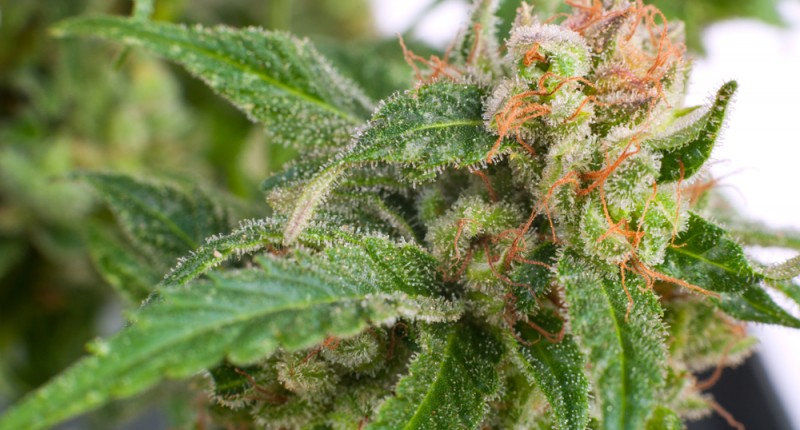
Uncle Sam has awarded the University of Mississippi $68.8 million to grow marijuana and analyze it.
Marijuana plants fill a grow room in the University of Mississippi research lab.
The contract awarded by an arm of the National Institutes of Health will go to a marijuana research lab at Ole Miss, which has been the only Government funded marijuana grower since 1968. The project is growing upwards of 30,000 plants, according to the Los Angeles Times.
While cannabinoids occur naturally in the cannabis plant, this research was done with WIN 55,212-2, a synthetic cannabinoid that produces a effect, similar to that of THC, one of marijuana’s psychoactive compounds. The researchers specifically looked at the effect of this synthetic cannabinoid on exposure to trauma reminders. Among individuals who suffer from trauma, it’s common for non-traumatic events (for instance, a balloon being popped), to evoke the memory of the traumatic event, thus amplifying the negative effects of the trauma. And a major indication for the veterans of the world to be afforded the medical marijuana that will help the individual the most. Some strains of cannabis that work well for one person may not work at all for someone else, and in fact may have a negative effect. Therefore strict rules must be in place for those not titrated with cannabis, to prevent a dosage that is to high (or low), resulting in overdose or a negative experience. The dosage should be high enough to produce the desired result (I.E. Relaxation), but low enough to prevent adverse reactions.
In the first part of the experiment, the researchers exposed rats to a traumatic event such as (electric shock). After the trauma, some of the rats were injected with the synthetic cannabinoid compound. On the third and fifth days of the trial, the rats were exposed to ‘trauma reminders’ which triggered memories of the electric shock. Then, the rats went through a trauma ‘extinction procedure,’ a process similar to exposure therapy, designed to help them cope with post-trauma symptoms.
The researchers found that after being exposed to the trauma reminders, the rats injected with synthetic cannabinoids did not exhibit PTSD symptoms such as impaired extinction learning, increased startle response, changes with pain sensitivity and impaired plasticity in the brain’s reward center. The control group of rats who were not administered the substance, however, did experience these symptoms. The treated rats also fared better after the trauma reminders than a group of rats administered with the SSRI antidepressant sertraline (Zoloft), a substance which has been used in the treatment of Post-Traumatic Stress Disorder(PTSD) with mixed success in reducing symptoms.
The researchers also determined the neurological basis for these behavioral effects. They found that among the rats who were exposed to trauma and trauma reminders, there was an increase in the expression of two brain receptors associated with emotional processing (the CB1 and GR receptors). The compound actually prevented the increase in expression of these two receptors in two brain areas involved in forming and saving traumatic memories, the hippocampus and the prefrontal cortex.
One of the study’s lead authors, Dr. Irit Akirav, previously found a synthetic marijuana compound to be effective in reducing PTSD symptoms in rats if administered within 24 hours of the traumatic event itself. Now, Akirav’s new research suggests that marijuana may also be an effective intervention at the later trauma-reminder stage.
While the research is preliminary, it does suggest that human trials should be conducted to examine marijuana’s promise as a treatment option for PTSD.
“The findings of our study suggest that the connectivity within the brain’s fear circuit changes following trauma, and the administration of cannabinoids prevents this change from happening,” the researchers concluded. “This study can lead to future trials in humans regarding possible ways to prevent the development of PTSD and anxiety disorders in response to a traumatic event.”
And in recent years, there has been an increase in the demand from veterans, to be allowed access to medical marijuana. It has long been known in the cannabis community that medical cannabis can greatly benefit people suffering.
Veterans suffering from PTSD is a particular area of despair that the medical marijuana community finds extremely discouraging in that it is preventable. War is never preferred over peace, yet it seems to be endless these days in America. If we are willing to send our people to war, we must be at least equally as willing to allow them access to all treatments, including medical cannabis, when they return home.
Nearly 30 percent of veterans who served in the Iraq and Afghanistan wars suffer from PTSD, according to a 2012 VA report. Some scientists have suggested that marijuana may help PTSD symptoms, which can include anxiety, flashbacks and depression. In a recent study, patients who smoked cannabis saw an average 75 percent reduction in PTSD symptoms.
A 75 percent reduction is great news for many. And we hope that many veterans are treated with all available treatment options, including medical marijuana.